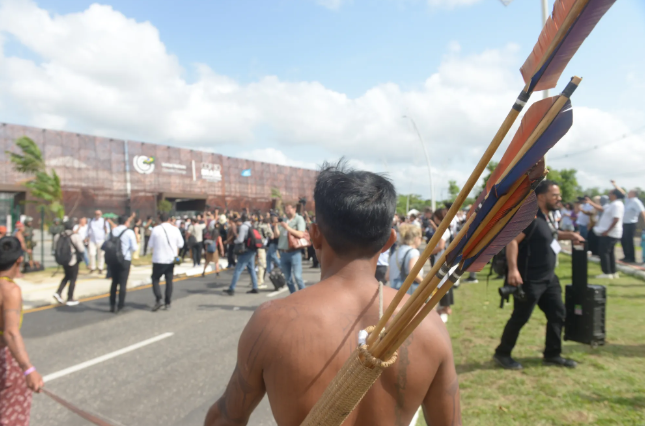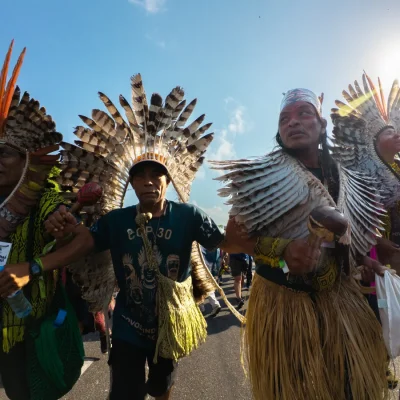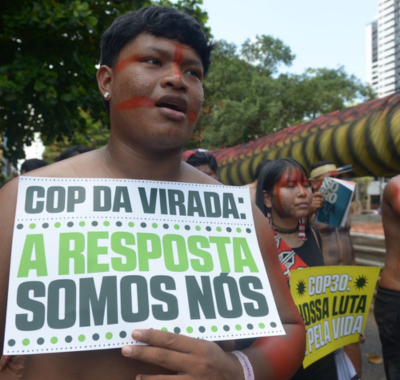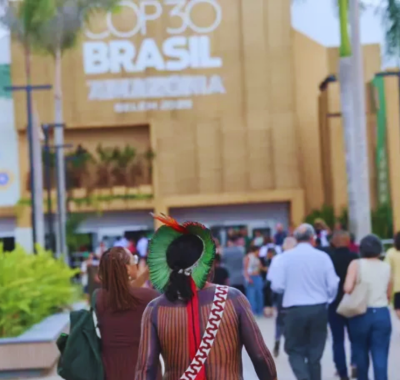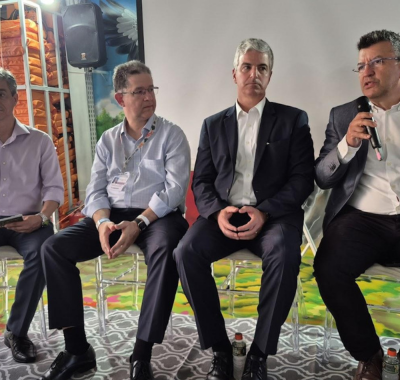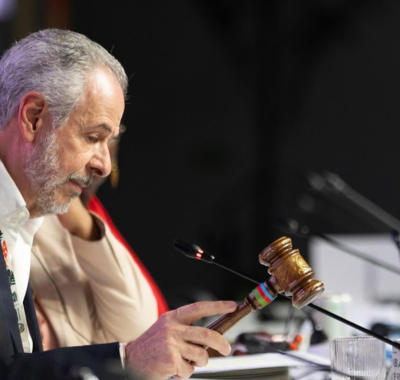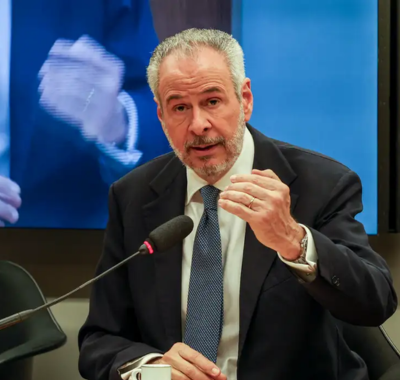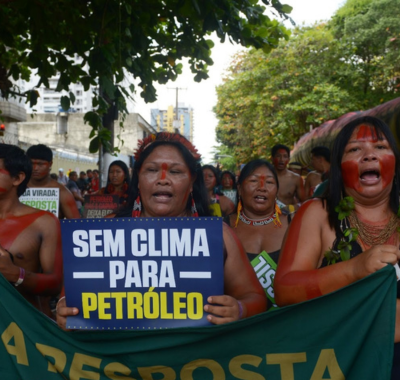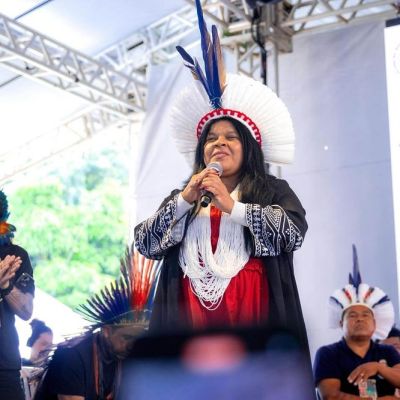Munduruku Indigenous People demanded the demarcation of their territories and the revocation of infrastructure projects affecting their lands; the movement held a peaceful demonstration in front of the Blue Zone, a space where climate negotiations take place
By Fábio Bispo
Translated by Diego Lopes/Verso Tradutores
Following a protest at the main entrance of the 30th United Nations Climate Change Conference (COP30) on Friday morning (14), the federal government announced that it will move forward with the demarcation of the Sawré Muybu and Sawré Ba’pim Indigenous Lands, belonging to the Munduruku People, in Pará, and committed to analyzing the impacts of large infrastructure projects in the Tapajós basin.
The promises were made after a meeting between the president of COP30, Ambassador André Corrêa do Lago, the Minister of Indigenous Peoples, Sonia Guajajara, the Minister of the Environment and Climate Change, Marina Silva, and Munduruku leaders, organized by the Ipereg Ayu Movement. The entrance to the Blue Zone was blocked and only reopened after the group was received by the government delegation.
“Our biggest concern is the decree and the Ferrogrão railway; this will harm us considerably. Being here with Sonia, with Minister Marina, and with the president of COP is already progress. But we need to be heard more, to be consulted,” stated leader Alessandra Munduruku after the meeting. “We want an answer from Lula.”
The main target of the protest is Decree No. 12,600/2025, which established the National Waterway Plan and included the Tapajós, Madeira, and Tocantins rivers as priority routes for cargo navigation. For the Munduruku People, the decree “opens the floodgates” for new dredging, the removal of sacred rapids, and the accelerated expansion of private ports along the basin.
Six Indigenous territories, home to approximately 2,600 people, including the isolated Pu’rô , Iriri Novo, and Mengra Mrari Peoples, will be affected by the route of the Ferrogrão railway, which will connect the municipalities of Sinop (MT) and Itaituba (PA).
Indigenous people denounce that the projects planned for the region did not comply with the prior, free, and informed consent, as stipulated in ILO Convention 169.
Indigenous people presented data from a study by the Institute of Socioeconomic Studies (Inesc), which points to the impacts of infrastructure projects in the Tapajós basin. Between 2010 and 2022, 68% of all federal investment in infrastructure in the region was allocated to export corridors, including the BR-163 highway, the Itaituba/Miritituba terminals, and waterway projects on the Tapajós River. In 2023, 47% of Brazil’s soybean exports flowed through the ports of the Northern Arc—compared to 16% in 2010.
“All of this happens without the government listening to us. They want to destroy the riverbed, blow up our sacred rapids, and fill the Tapajós River with barges to take soybeans out of Brazil. We are the ones who live here, not the companies,” said a Munduruku leader.
‘It’s legitimate,’ says minister about protest
In a press conference following the meeting with the Munduruku Indigenous People, Minister Sonia Guajajara stated that the protest is legitimate and that the demarcation processes for the two lands are in an advanced stage, depending only on administrative procedures.
“It’s legitimate, this protest is legitimate. They came here to ask for clarification about the demarcation of the territories. The demarcation process of Sawré Muybu has already been signed by Minister [Ricardo] Lewandowski and the Sawré Ba’pim process is at the Ministry of Justice, as part of a package of Indigenous land agreements that should be signed by the end of this year.”
According to Guajajara, the government is hiring a company responsible for the physical demarcation of Sawré Muybu, for the installation of markers and signs at the territory’s boundaries. Marina Silva also reinforced that Ferrogrão does not have environmental licensing under review by IBAMA and that the case remains in litigation.
“There is no licensing request within IBAMA [Brazilian Institute of Environment and Renewable Natural Resources], this process is in litigation. When the EIA/RIMA [Environmental Impact Assessment/Environmental Impact Report] was submitted, it was very poor, and IBAMA returned it. Since then, it has not been resubmitted, but their concern remains. It is a legitimate concern.”
Marina also reported that the demands regarding waterways, navigation, and ports will be forwarded to the Ministries of Transport and Mines and Energy, and that IBAMA will continue with inspection operations, including actions to remove illegal miners from indigenous territories.
‘The river has a family’
At the end of the meeting, Alessandra Munduruku reaffirmed that the movement will not accept projects that threaten the territory.
“The river is the mother of the fish. It has a family, it has a father, it has a mother, it has an uncle who lives inside it and sustains us.”
The Munduruku are also awaiting a decision on carbon credit projects. For the movement, such initiatives represent forms of “selling the forest,” which remove the autonomy of the people, allow the entry of companies and intermediaries into their territories, and do not address the root of the climate crisis: industrial deforestation, illegal mining, waterways, and the expansion of soy cultivation.
This report was produced by InfoAmazonia, through the Collaborative Socio-environmental Coverage of COP 30. Read the original report at: https://infoamazonia.org/2025/11/14/governo-brasileiro-anuncia-demarcacao-de-duas-terras-indigenas-apos-protesto-munduruku-na-cop30/

